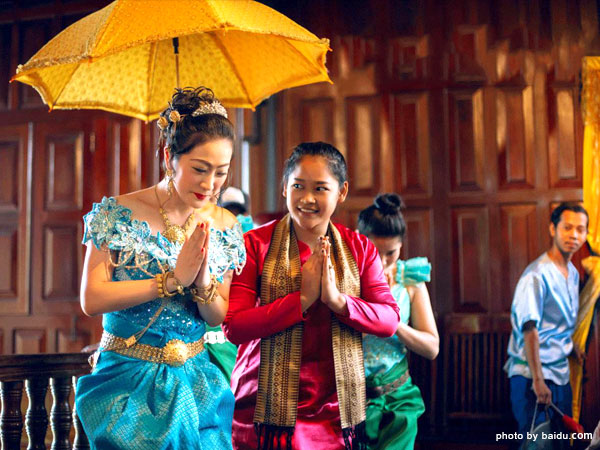Finding and understanding the needs and preferences of the customers and the market in Phnom Penh can be challenging, especially if you are not familiar with the local culture and context. Therefore, it is important to be aware of some of the cultural differences that may affect your business interactions and relationships in Phnom Penh. Here are some of the key aspects that you should consider:
Language
Khmer is the official language of Cambodia and is used in most social contexts including government administration, education at all levels, and in the mass media. It is spoken by roughly 90% of the population. Regional differences are slight and normally mutually intelligible. Based on the dialect of the capital city of Phnom Penh, Modern Khmer is used throughout the nation and widely understood by its inhabitants. Much Khmer vocabulary used in literature, the military, and administration is borrowed from Sanskrit, or Pali.
Due to years of French colonial rule, French became widely spoken within the educated classes. However, when the Khmer Rouge took power in the 1970s, they killed many educated people which saw an almost total decline of French language influences. These influences are now limited to ad-hoc words only. English is also widely spoken as a second language, especially among younger generations and in urban areas. It is also the main language of business communication in Phnom Penh.
When doing business in Phnom Penh, it is advisable to learn some basic Khmer phrases and greetings to show respect and appreciation for the local culture. You can also use English or French as a common language with your business partners, but make sure to speak clearly and avoid using slang or idioms. You may also want to hire a professional interpreter or translator if you need to deal with complex or technical matters.
Religion
The majority of Cambodians follow Theravada Buddhism which originated in India. It teaches that that life and death in this world are intertwined through the concept of reincarnation. Every person lives a life as a worldly being and depending on their behaviour will come back in their next life as a higher or lower being. “Karma” is the term used to describe this – i.e. if you do good you will have good karma. A rough translation of this is, “you reap what you sow.” Theravada Buddhism has the following principles:
• Have the right thoughts.
• Have the right goals.
• Speak the right words.
• Perform the right deeds.
• Earn a living in the right way.
• Make the right effort.
• Be intellectually alert.
• Meditate.
Buddhism also reinforces a sense of hierarchy within society. Interpersonal communication is built on the relationship between those involved. Common hierarchical guidelines are that parents are superior to children, teachers to students and managers to subordinates.
When doing business in Phnom Penh, it is important to respect the religious beliefs and practices of your business partners and customers. You should avoid any actions or words that may offend or insult their faith or values. For example, you should not touch or point at someone’s head, as it is considered sacred in Buddhism. You should also not point your feet at someone or step over them, as it is considered rude and disrespectful. You should also dress modestly and conservatively, especially when visiting temples or religious sites.
Etiquette
Cambodians are generally friendly, polite, and hospitable people who value harmony and cooperation. They tend to avoid confrontation and direct criticism, and prefer to use indirect or subtle ways to express their opinions or feelings. They also tend to smile a lot, even when they are unhappy or uncomfortable, as a way to maintain a positive atmosphere.
When doing business in Phnom Penh, it is essential to follow some basic etiquette rules to make a good impression and build trust with your business partners and customers. Here are some of them:
• Greetings: The traditional way of greeting someone in Cambodia is by placing your palms together at chest level and bowing slightly. This gesture is called “sampeah” and it shows respect and courtesy. The higher you raise your hands, the more respect you show. You should use this gesture when meeting someone for the first time, when saying goodbye, or when thanking someone. You can also shake hands with your business partners, but only after they initiate it. You should use your right hand only, as the left hand is considered unclean. You should also greet people according to their rank or seniority, starting with the most senior person.
• Names and titles: Cambodians use a complex system of names and titles that reflect their social status, age, and relationship. They usually have two or three names, with the first name being the family name and the last name being the given name. They also use honorific titles before their names, such as “Lok” for men and “Lok Srey” for women, which mean “Mr.” and “Ms.” respectively. They may also use other titles based on their profession, such as “Oknha” for a wealthy businessman or “Achar” for a teacher. You should always address your business partners by their full name and title, unless they invite you to use their first name. You should also use your own full name and title when introducing yourself.
• Business cards: Business cards are important in Cambodia, as they show your identity and position. You should exchange business cards with your business partners at the beginning of a meeting or a conversation. You should use both hands to give and receive business cards, and look at them carefully before putting them away. You should also have your business cards printed in both English and Khmer, and use the Khmer side when presenting them to your business partners.
• Meetings: Meetings in Cambodia are usually formal and structured, and follow a set agenda. They are often led by the most senior person, who makes the final decisions. You should arrive on time or slightly early for a meeting, as punctuality is expected and appreciated. You should also dress professionally and conservatively, and avoid wearing bright colors or flashy accessories. You should greet your business partners with a sampeah or a handshake, and exchange business cards with them. You should also wait for them to show you where to sit, as seating arrangements are based on rank or seniority. During the meeting, you should be polite and respectful, and avoid interrupting or contradicting your business partners. You should also be patient and flexible, as meetings may take longer than expected or be interrupted by phone calls or visitors. You should also be prepared to answer questions or provide details about your products or services. After the meeting, you should thank your business partners for their time and attention, and follow up with them by email or phone to confirm the next steps or actions.
• Negotiations: Negotiations in Cambodia are often slow and lengthy, as they involve a lot of discussion and consultation among the parties involved. They are also influenced by personal relationships and trust, rather than facts and figures. You should be prepared to invest time and effort to build rapport and trust with your business partners before getting into serious negotiations. You should also be respectful and courteous, and avoid being aggressive or pushy. You should also be flexible and willing to compromise, as Cambodians value harmony and cooperation over competition and confrontation. You should also be aware of some cultural nuances that may affect your negotiations, such as:
• Cambodians may not say “no” directly, but use phrases such as “maybe”, “we will see”, or “it is difficult” to indicate disagreement or refusal. You should pay attention to their tone of voice, facial expressions, and body language to understand their true meaning.
• Cambodians may not give you a clear answer or commitment, but say “yes” to everything to avoid offending you or losing face. You should not take their “yes” for granted, but confirm it with concrete actions or evidence.
• Cambodians may not show their emotions openly, but smile or laugh to hide their feelings or discomfort. You should not mistake their smile or laughter for agreement or acceptance, but probe further to find out their real opinion or intention.


